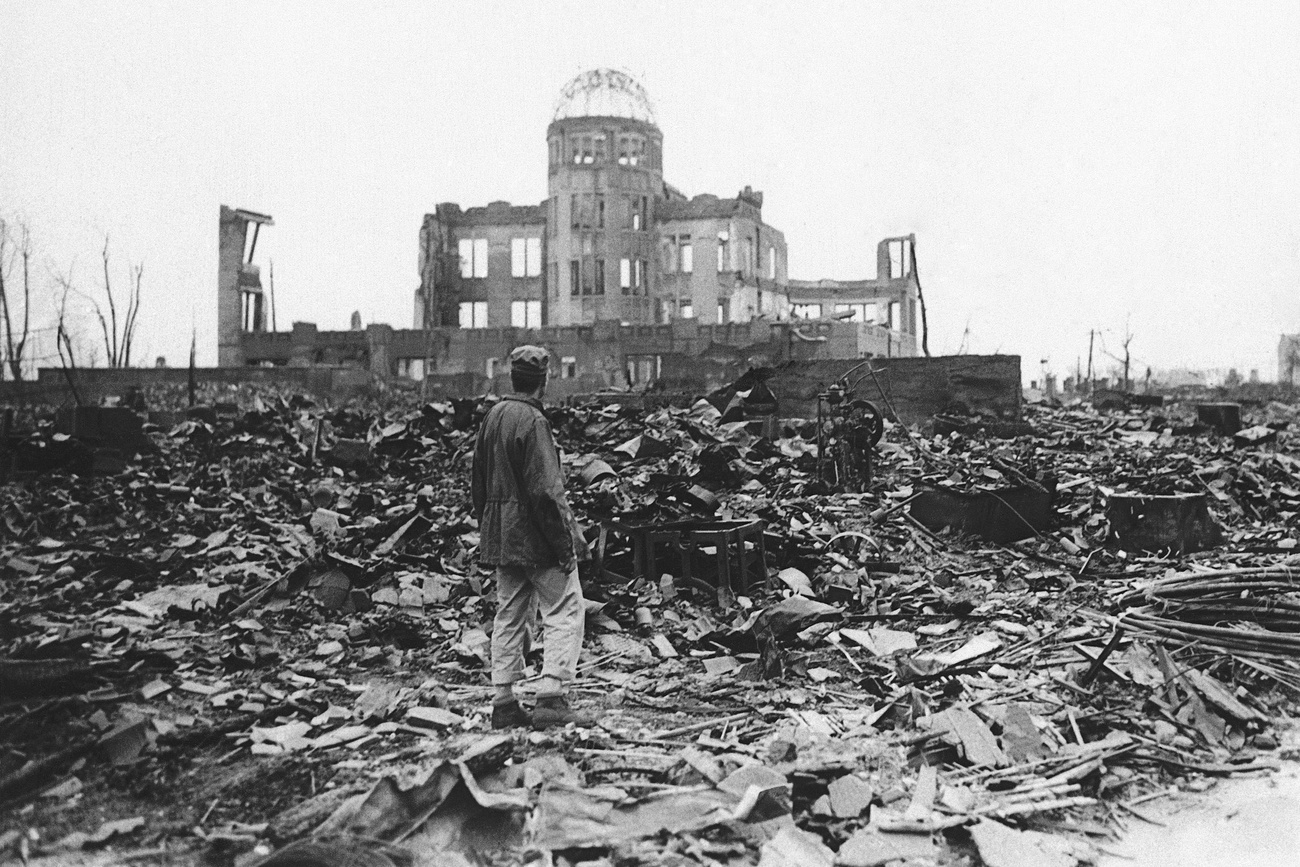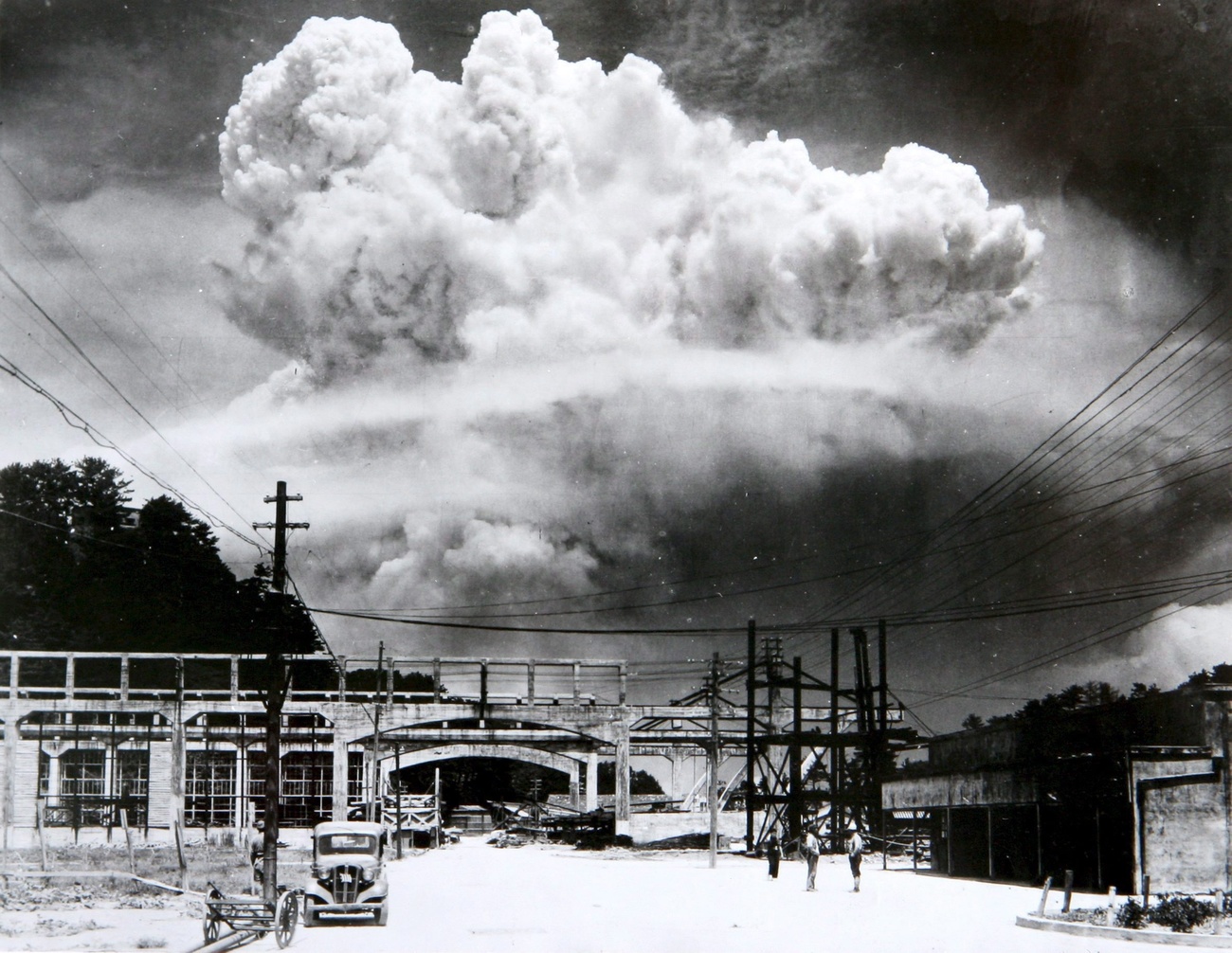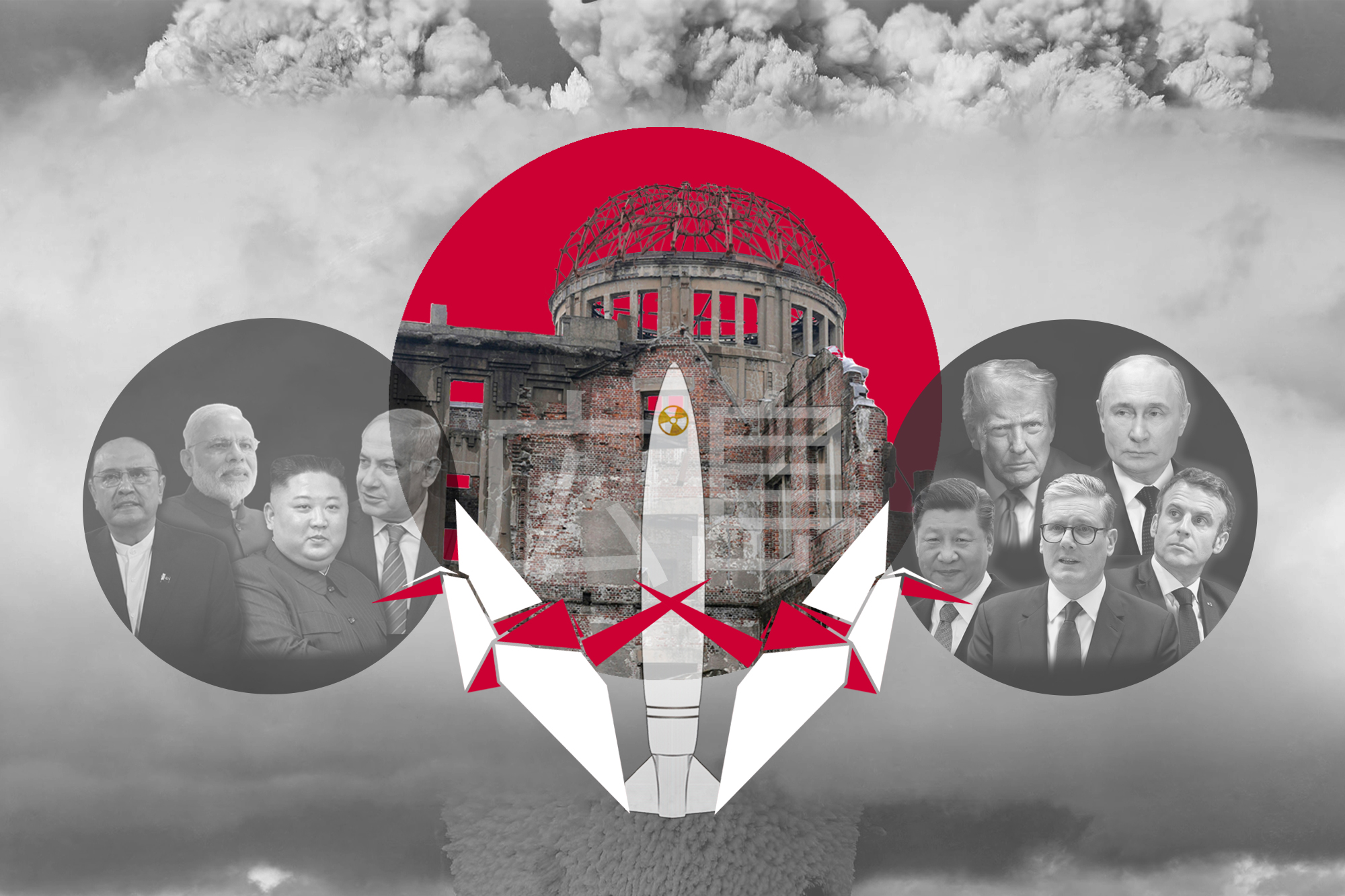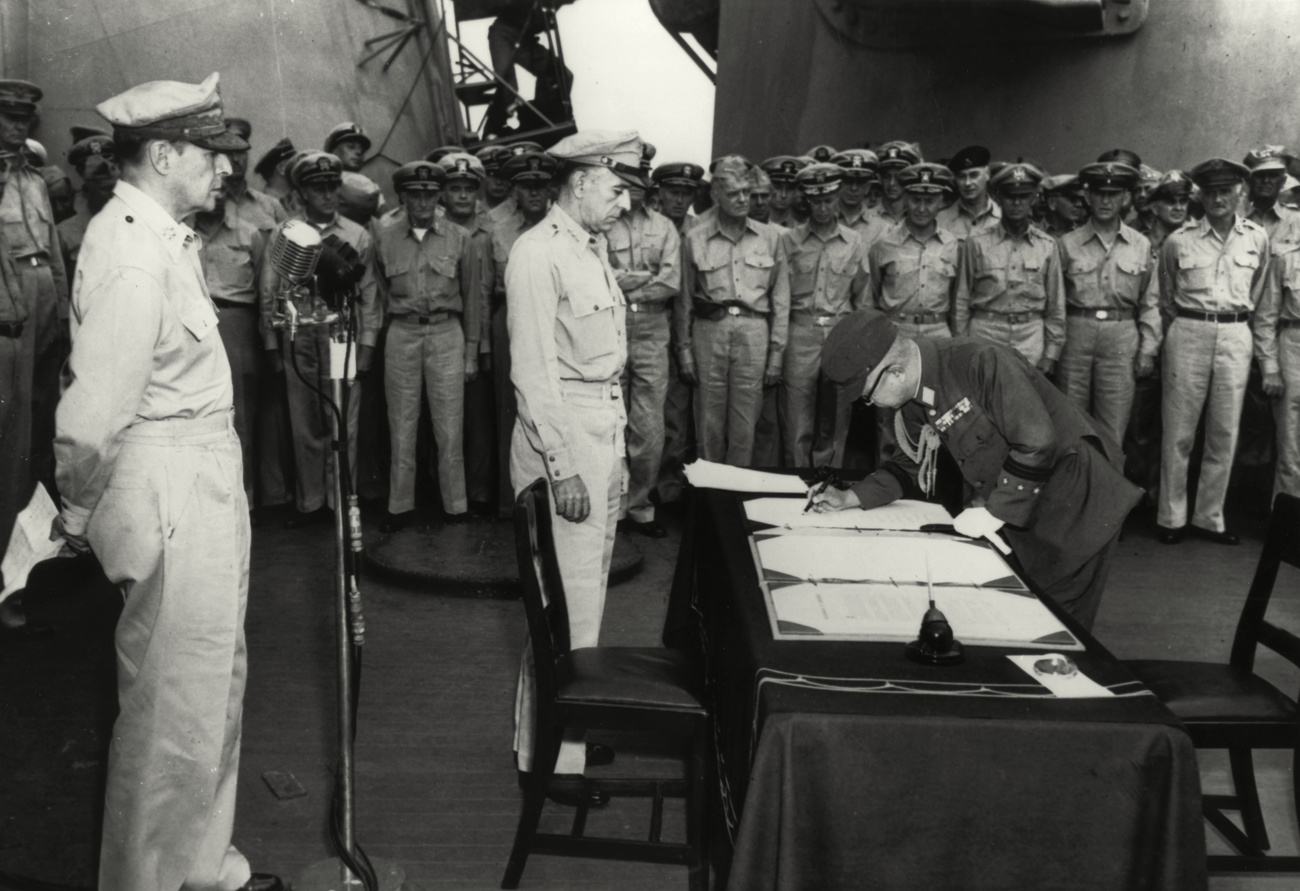
A war correspondent in Hiroshima, some weeks after the atomic bomb was dropped on the city.
AP / Keystone
Listen to the article
Listening the article
Toggle language selector
English (US)
English (British)
Generated with artificial intelligence.
Eighty years ago, US atomic bombs fell on Hiroshima and Nagasaki, killing more than 200,000 people and forcing Japan to surrender. Swiss diplomat Camille Gorgé (1893-1978) wrote about the events firsthand in memoirs now meeting with interest in Japan.
This content was published on
August 2, 2025 – 10:30
Bruno Kaufmann

Bruno is SWI swissinfo.ch’s global democracy correspondent as well as being a long-term foreign correspondent for the Swiss Broadcasting Company, based in Sweden. He is also the Director of International Relations at the Swiss Democracy Foundation, Co-president of the Global Forum on Modern Direct Democracy and Co-initiator of the International League of Democracy Cities.
By the summer of 1945, the Second World War was already over in Europe. But on the other side of the planet, it was still raging. Eighty years ago, the conflict culminated in four dramatic days that changed the world: on August 6 and 9, the atomic bombings of Hiroshima and Nagasaki claimed more than 200,000 lives. Camille Gorgé, Switzerland’s envoy to Japan, witnessed the events firsthand and documented them in detail.
The following entries are taken from his memoirsExternal link:
August 7, 1945
The city of Hiroshima was destroyed by a bomb: a single bomb, but unlike any seen before, with a mysterious composition and a force a thousand times stronger than conventional bombs. The number of fatalities is believed to be substantial. The drama apparently unfolded in just a fraction of a second.
August 8, 1945
The Hiroshima bomb is said to have claimed 100,000 lives. There is no doubt that with this new so-called atom bomb humanity has entered a new era.
August 9, 1945
Another disaster: Nagasaki suffered the same fate as Hiroshima. A second atomic bomb destroyed the city.

The mushroom cloud from the atomic bomb dropped over Nagasaki, August 9, 1945.
EPA / Nagasaki Atomic Bomb Museum
August 10, 1945
Events are unfolding fast. The imperial government is said to have agreed to an unconditional surrender with the sole condition that the Emperor keep his throne and his prerogatives.
On the evening of August 10, 1945, the Japanese envoy in Bern, Shunichi Kase, visited the head of the Swiss foreign ministry to communicate Japan’s declaration of surrender. At the time, Switzerland held numerous protecting power mandates; among them was its role as intermediary between Japan and the US.
After the visit, the Swiss brokered a diplomatic exchange between the two countries, just as a group of Japanese army officers attempted a coup. The mediation succeeded, the coup failed, and the Second World War officially came to an end on September 2, 1945 – with Japan’s surrender.
Switzerland as protecting power
By the end of the war, neutral Switzerland had up to 219 protecting power mandates, and used its good offices to represent the interests of many countries vis-à-vis their enemies. As such, diplomats like Gorgé played a key role at the time.
Which protecting power mandates does Switzerland still have in 2025? Read more in our overview:

More
Need a diplomatic messenger? Switzerland is eager to help
Swiss diplomacy has a long-standing tradition of trying to talk to all sides “to build trust”.
Read more: Need a diplomatic messenger? Switzerland is eager to help
Gorgé originally came from a valley in the Swiss Jura region. After gaining a law degree from the University of Geneva in 1917, he started work as a legal adviser at the economic affairs ministry in Bern, before starting a career at the foreign ministry. Eager to explore the world, he served as legal adviser to Japan’s foreign minister in Tokyo from 1924 to 1926.

Pierre-Yves Donzé.
Courtesy
“Gorgé was fascinated by Japan and supported the government’s pro-Western orientation and its push for modernity at the time,” Pierre-Yves Donzé tells Swissinfo. Donzé, who also comes from a valley in the Jura, has lived in Japan for almost 20 years and is now a professor of economic history at Osaka University.
While researching the impact and role of Swiss companies in Japan, Donzé repeatedly came across Gorgé’s name. “As Switzerland’s official representative in Japan during the war years from 1940 to 1945, Gorgé gave work to numerous Swiss company representatives who had lost their jobs but were unable to leave the country. He brought them to his office at the embassy which, at times, represented the interests of over 20 countries,” Donzé says.
Together with historians Claude Hauser, Andy Maître and Pascal Lottaz, Donzé studied the unpublished memoirs which the Swiss diplomat wrote shortly after returning to Switzerland. He believes this account offers a “unique insight“ into life in Japan during the war and the role played by neutral Switzerland.
When Gorgé had left Japan in the 1920s, he was very fond of the country. But when he returned on February 15, 1940, he was – as Donzé put it – “shocked” by what he saw.
He recorded the moment in his memoirs:
“I shake countless hands on the platform. My fellow countrymen seem pleased to see us again, but I notice a certain awkwardness in their behaviour. They speak quietly and look around before they say anything. Anxiety is in the air. This Japan of 1940 is no longer the Japan of 1924. The country has turned into a police state that sees enemies and spies everywhere. Its natural xenophobia has grown harsher.”
Japan had already been at war with China since 1937. After Japan attacked Pearl Harbor in December 1941, things got worse for Gorgé as the rise of xenophobia went far beyond what he had previously described as “natural”. Gorgé writes about being physically assaulted; one diplomat he had personally deployed to Japanese-occupied Taiwan was killed by military police on his way home. Still, he held the fort. In the final phase of the war, in August 1944, the Swiss embassy, which employed more than 60 staff, was evacuated from Tokyo to a mountain region in the north, where it was placed under surveillance by Japanese intelligence.
More

More
80 years on: Hiroshima, Geneva and the global struggle to ban the bomb
This content was published on
Aug 2, 2025
Eighty years after the nuclear attack on Hiroshima, global spending on atomic weapons is surging. One survivor reminds the world what’s at stake.
Read more: 80 years on: Hiroshima, Geneva and the global struggle to ban the bomb
During the war years, Gorgé didn’t even come close to fully representing Swiss interests in Japan or fulfilling the duties associated with its role as protecting power. These responsibilities included facilitating communication between the warring parties, caring for prisoners of war and civilian internees and evacuating private individuals to their home countries.
Neutrality on the brink
Yet despite the trials and tribulations and his extremely limited room to manoeuvre, Gorgé still carried the “old” Japan in his heart. On July 27, 1943, he noted in his memoirs:
“Japan has two different faces. One is the Japan of art and ancestor-worship; the other is a militaristic police state. One is grace and beauty, the other ugliness and stupidity.”
Gorgé’s ambivalence towards his host country was further intensified by Switzerland’s policy of neutrality. “[This policy] was initially based on tradition and pragmatism, not least economic interests,” Pascal Lottaz tells Swissinfo. Lottaz, who contributed commentary to several sections of Gorgé’s memoirs, is now professor of international relations at Kyoto University. “Despite all the uncertainties, Switzerland consistently fulfilled its role as a diplomatic service provider throughout the war, right up to the bitter end.”
Memoirs bridge a gap in Japan
Gorgé’s memoirs were first published in French in 2018 and have recently been released in a complete Japanese edition. Publisher Donzé had a feeling that the book would attract interest. “Some local historians have suggested that Gorgé’s communication with the Americans may have helped Japan retain its imperial system,” he says. However, Donzé and his colleagues found no evidence to support this during their research.
At events hosted by the Swiss embassy in Tokyo, officials actively promoted Gorgé’s memoirs to Japanese researchers, several of whom told Swissinfo that they welcomed the publication. But how, and whether, the memoirs will be received by Japan’s historical scholarship remains to be seen.

Japanese General Yoshigiro Umezo signs a declaration of surrender in Tokyo Bay, September 2, 1945.
Akg-Images
On September 2, 1945, a Japanese government delegation signed a declaration of surrender aboard the US battleship Missouri in Tokyo Bay, marking the official end of the last interstate hostilities of the Second World War. With this, Gorgé’s mission in Japan also came to an end. After a final meeting with American General Douglas MacArthur and Japan’s Prime Minister Kijuro Shidehara – whom he had already met in the 1920s – Gorgé returned to Switzerland where he continued his diplomatic career until retirement in 1958.
Edited by Benjamin von Wyl; adapted from German by Billi Bierling/dos
More

More
Our weekly newsletter on foreign affairs
Switzerland in a fast-moving world. Join us to follow the latest Swiss foreign policy developments. We offer the perfect immersive package.
Read more: Our weekly newsletter on foreign affairs
Articles in this story
Read more
Next
Previous

More
How we reported the outbreak of the Second World War
This content was published on
Sep 1, 2019
Our predecessors used radio signals to reach their audience. Unfortunately, no audio recordings of broadcasts from August and September 1939 survived in our archives, but we did find the transcripts, some handwritten, of our broadcasts in German, French and English. Here’s our English-language broadcast that announced the outbreak of the war: The broadcaster then reads the government’s…
Read more: How we reported the outbreak of the Second World War


AloJapan.com